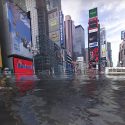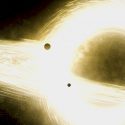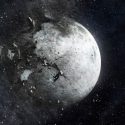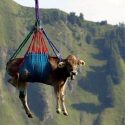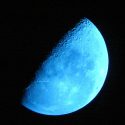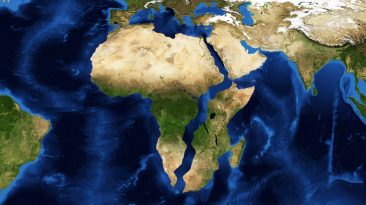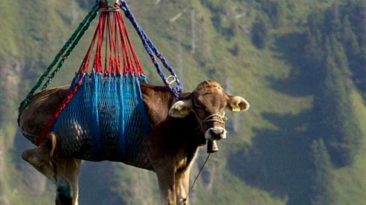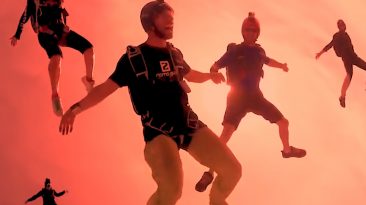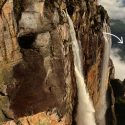See that strip of stars splashed across the night sky? That’s our home galaxy, the Milky Way. You can see it from Earth because we live on its very outskirts, far away from all the fun stuff happening in its center.
What would it be like to reside in its galactic downtown? Would we still have our familiar Sun?
What would our night sky look like? Would we get sucked into a black hole?
The Milky Way is huge – about 100,000 light-years across with billions upon billions of stars in it. It has four large, spiral arms encircling its center. That makes it a barred spiral galaxy, just like most galaxies in the observable universe.
If the Earth packed up its belongings and moved to the heart of the Milky Way, things would be looking pretty bleak for the survival of any kind of life on the planet. But not because of the Milky Way’s supermassive black hole…
The Earth is located in a quiet neighborhood in one of the smallest spurs of the Milky Way – the Orion Arm. We’ve got approximately 27,000 light-years between us and the galactic center.
It’s a comfortable spot to live in. The temperatures on Earth are just right to sustain life. And there aren’t too many space hazards that could wipe out our existence.
I didn’t say it’s completely safe, did I? Living anywhere near the center of the Milky Way would be… different.
It would depend on what part of that center the Earth had the misfortune to occupy. The closer you get to the heart of the galaxy, the tighter stars are packed together. Because of this high star density, the Earth would be blasted with a lot more radiation than what the Sun throws at you right now.
Under these circumstances, the odds of life ever evolving would be pretty small. But if the Earth moved to the center together with all its inhabitants, you’d find yourself very unlucky.
Earth’s magnetosphere wouldn’t be able to protect you from space radiation blasting from all directions. This could change the Earth’s climate, and cause everything on the planet to either mutate or die.
If you lived, your biggest concern would be a close encounter with a supernova. A supernova occurs when a massive star collapses releasing radio waves, X-rays, cosmic rays and gamma rays into space.
For all we know, one massive stellar body could throw the Earth out of the Sun’s orbit. Our planet would be surrounded by foreign stars until one of them exploded in a supernova and wiped us out for good.
But it would look spectacular from Earth, though only for a brief moment. That is, if you were able to see anything in the sky. With so many stars shedding their light on Earth, chances are you’d just think the supernova was a new form of light pollution.
There’s another big hazard that lies within the Milky Way’s center – a supermassive black hole called Sagittarius A*. If getting sucked into a black hole isn’t on your to-do list, consider yourself lucky.
The Earth might stay far enough from it that we wouldn’t get engulfed by this cosmic beast. But we could get close enough to get caught in the black hole’s orbit.
Orbiting a black hole would be very much like riding the Rotor at a theme park. At a distance of 20 billion km (12 billion mi) from the black hole’s event horizon, the Earth could develop a speed of 25 million km/h (15.5 million mph). That’s over 230 times faster than the speed our planet is moving at right now.
Would that mean strong winds? More natural disasters? Would you end up flying off into space and right into the black hole?
It sure wouldn’t be good for you, or anything else on the Earth’s surface. The Earth is perfectly designed to be right where it is. It could survive on the outskirts of the galaxy, but you wouldn’t want it to be anywhere else.
The most dangerous place for a planet to be located is anywhere near the center of a galaxy – any galaxy. And if you want a nice view, your best bet might be to teleport the Earth to the middle of a nebula instead.
Subscribe to What-If on Youtube or follow the show on Facebook Watch.
Sources
- “Does Our Galaxy Have A Habitable Zone?”. Cain, Fraser, 2016. phys.org. Accessed June 28 2019.
- “Our Milky Way Galaxy: A Traveler’s Guide (Infographic)”. Tate, Karl. 2012. space.com. Accessed June 28 2019.
- “Milky Way Galaxy: Facts About Our Galactic Home”. Redd, Nola. 2017. space.com. Accessed June 28 2019.
- “The Most Likely Spots For Life In The Milky Way”. Skibba, Ramin, 2015. Science | AAAS. Accessed June 28 2019.
- “Stars (Including 1 Daredevil) Circle The Milky Way’s Monster Black Hole (Time-Lapse)”. Mathewson, Samantha. 2018. space.com. Accessed June 28 2019.
- “The Center Of The Milky Way May Be Chock-Full Of Black Holes”. Smithsonian. Accessed June 28 2019.


